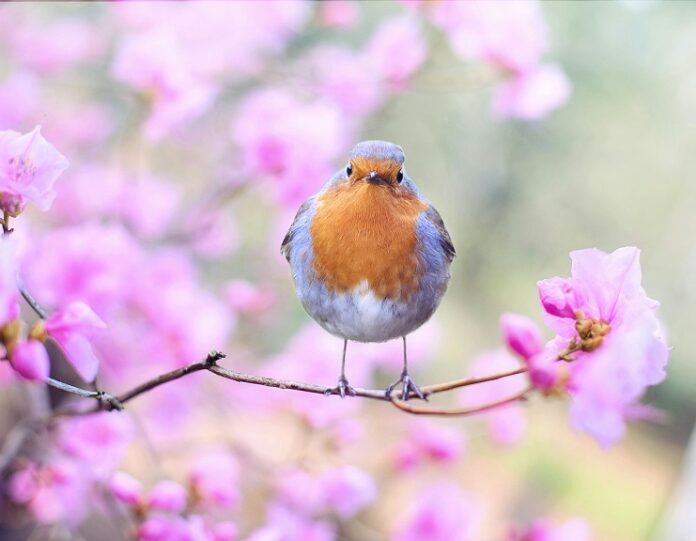By Rashmi Bora Das
Special to CSMS Magazine
The maple tree in my backyard was the first one to be fully clothed in green. It was a signal that spring was on the way. It made me ecstatic because I have an emotional attachment to it. Several years ago, my little one, with his tiny hands, had gifted me the sapling on Mother’s Day.
The world rejoices upon the arrival of spring. Renewal, rebirth, and rejuvenation are linked to this season that adorns our surroundings with pretty shades and hues. As we transition from winter, warmer temperatures greet us. The tender green leaves cover the branches of trees that lay bare during the winter months. Flowers bloom, and the symphony of birds is a treat to our ears. Nature bounces back to action, showering abundant blessings on mankind.
The resplendent beauty of spring has the invincible power to stir feelings that flow organically with unencumbered ease. Those passions and emotions have crystallized into beautiful poetry that has carved its niche in the literary realm. I share a few spring poems from a rich treasury of old times, with each one centering on a different line of thought.
Reflection on Nature’s holy plan
Lines Written In Early Spring (1798) by William Wordsworth is a poem that delicately blends sweet and sad emotions. Sitting in a grove, the poet is totally mesmerized by the beauty around him. It is his profound belief that every flower is enjoying the breath of fresh air and that the budding twigs are eager to embrace the breeze. Although he does not understand the language of the birds, every movement speaks of their immense pleasure.
In the midst of all this happiness, a tinge of sadness descends upon the poet. It hurts him to think how human beings have forgotten about the loveliness that heaven has bestowed upon them. He laments on how people tend to treat one another with unkindness and disrespect:
If this belief from heaven be sent,
If such be Nature’s holy plan,
Have I not reason to lament
What man has made of man?
A paean to innocence
William Blake’s Spring (1789) is essentially a celebration of innocence. The poet says that the sounds of children and other beings in the lap of nature have ushered in the new year. All that is felt is a sense of happiness, unalloyed:
Sound the Flute!
Now it’s mute.
Birds delight
Day and Night.
Nightingale
In the dale
Lark in Sky
Merrily
Merrily Merrily to welcome in the Year
A joyous note prevails throughout the poem, emphasized by the line “Merrily, merrily, to welcome in the year” in each of the three stanzas. The theme of innocence is pronounced as Blake uses the images of the child, the birds, and the lamb to paint the picture of a spring landscape soaked in absolute purity.
Recognizing the impermanence of life
Robert Herrick’s short poem To Daffodils (1648) draws images from nature to ponder on the brevity of life. The transience of our earthly existence is likened to the fading away of the daffodils with the passing away of spring.
The poet pleads with the beautiful flowers to stay a little longer but understands that they have as short a spring as we do:
We have short time to stay, as you,
We have as short a spring;
As quick a growth to meet decay,
As you, or anything.
He resigns himself to the fact that like summer rain and the pearls of morning dew, our days and those of the daffodils are bounded by time which is finite.
Spring is a reminder of the absence of a loved one
William Shakespeare’s adoration for a “Fair Youth” finds expression in a sequence of poems and Sonnet 98 (1609) is one of them. The speaker, who misses his beloved, tells him that he fails to appreciate the wonders of nature around him. The “lily’s white” and “the deep vermillion in the rose” fail to bring him joy. The beauty of spring, which seems like mere imitations of his lover, has only brought him anguish and pain:
They were but sweet, but figures of delight,
Drawn after you, you pattern of all those.
Yet seemed it winter still, and you away,
As with your shadow I with these did play
Joy knows no bounds in Spring!
The world depicted by Thomas Nashe in Spring, the Sweet Spring (1600) is nothing short of a paradise. The poet calls the season the “year’s pleasant king”.
Happiness overflows the brim with flowers blooming, birds chirping, lambs frisking, and maids dancing. There is romance in the air as young lovers meet. The cuckoo’s songs rent the air. There is no room for worries, with all and sundry reveling in the gaiety of spring:
The fields breathe sweet, the daisies kiss our feet,
Young lovers meet, old wives a-sunning sit,
In every street these tunes our ears do greet:
Cuckoo, jug-jug, pu-we, to witta-woo!
Spring, the sweet spring!
Such is the power of spring; it evokes a plethora of emotions that find expression in the magnificent canvas of literature. May you enjoy the beauty of this magical season. Happy Spring!
Note: Rashmi Bora Das is a freelance writer settled in the suburbs of Atlanta, GA. She is the author of From Life’s Cove: Laughs, Musings, & More. You may visit her at www.rashmiwrites.com)
Also, see: The Role of Empathy in Friendships: How Understanding Others Deepens Relationships


